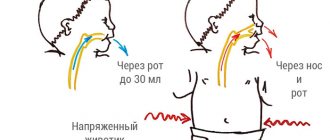Views - 18,334
Children's fears are an important component of a child's development precisely because by overcoming them, the child grows up and his nervous system becomes stronger. However, for parents, the appearance of certain phobias in a baby, in particular if the baby is afraid of loud sounds, raises a lot of questions, the essence of which boils down to the following: is everything normal with the baby? Let's look at the reasons and methods of dealing with the fear of loud noises in children of different ages.
- What to do if the baby is scared
How to help a baby under one year old: use voice and tape recorder - How to help a child from 1 to 3 years old: accustoming him to music and household appliances
Why is a child afraid of loud sounds and unpleasant buzzing?
Each childhood fear manifests itself most often at a certain age and is caused by characteristic reasons.
Natural reaction of the psyche to noise
A newborn baby, as a rule, sleeps soundly day and night: his sleep is not disturbed by loud sounds, speech, or background noise. But already from the second month of life the situation begins to change. The baby shudders and cries from a telephone ringing, the hum of a working vacuum cleaner and other household appliances, loud conversation and laughter of adults, the singing of a tape recorder or a wind-up toy. The reaction can even reach the point of hysteria, but parents often do not know what to do.
Loud noises often cause a baby to cry loudly
In fact, the reason for such fear is not errors in upbringing or oversight on the part of adults. This is a completely normal reaction of the developing psyche: a baby associates a loud sound with danger (the baby experiences a similar feeling in the presence of strangers or when he is afraid of being left without his mother). In addition, prolonged noise causes discomfort in the hearing organs.
Fear of loud sounds is a natural innate reaction of the body.
This behavior, which is a natural manifestation of the instinct of self-preservation, lasts relatively short time - up to 12-18 months. Sometimes loud sounds frighten children under three years of age: as a rule, these are overly sensitive, vulnerable and anxious children. Of course, adults should treat them with special attention and sensitivity.
If, after three years, phonophobia does not go away, and even more so is accompanied by additional fears (the child is constantly anxious, avoids communicating with people), then parents need to seek help from a specialist in order to avoid serious problems with the nervous system in the future.
Why loud noise is harmful to a child
Prolonged loud noises are not safe for children. They cause overstrain of brain cells, which become unable to fully coordinate the body’s work. This leads to disruption in the functioning of various organs, in particular the liver and heart. In addition, the ears gradually lose sensitivity from sharp sounds and unpleasant hums. The child develops a persistent feeling of anxiety, he is prone to fear, and almost does not smile. These babies tend to sleep poorly and get tired quickly because it is difficult for them to completely relax their muscles.
Acquired life experience as a cause of fear
The fear of loud sounds, inherent in the baby by nature itself, may be aggravated over time by additional reasons.
- Behavior of parents and relatives. An overly emotional reaction from loved ones (most often mothers or grandmothers) to the actions of the little researcher, loud shouts like “Don’t touch!”, “Don’t go in there!” can provoke stress in a child and heighten the sense of danger.
- An unexpectedly heard sharp bang or explosion, for which the baby’s psyche was not prepared. Some people happily forget about their experiences, while others develop a persistent fear.
- Some household appliances make very unpleasant loud sounds: the shrill ringing of an alarm clock, the hum of a vacuum cleaner, or an electric meat grinder. Cooking and cleaning in the presence of the baby often causes his negative reaction.
- Watched an episode from a horror movie (by accident or due to the careless behavior of parents viewing such content in the presence of their offspring). This video is aimed at tickling the viewer's nerves. And a characteristic feature of horror films is a piercing scream or other sharp sound at the most unexpected moment. Few children will take what they hear calmly, most will have poor sleep the next night, and some will develop phonophobia. By the way, the cause of fear can also be a disaster scene accompanied by a roar.
- Bad experience of inflating a balloon - it burst with a deafening sound (or a child witnessed such an incident). This fear even has its own name - globophobia.
- The thundering sounds of fireworks during a celebration in the city square. Children who are too young should not be taken to such events.
- Children's fear can be caused by the noise of a working drill, hammer drill or other repair attribute.
- Aggressive sounding toys. Parents should be careful when choosing toys for their baby, because the modern industry is ready to attract buyers in various ways, and this is not only the bright color of the product.
- Storm. Deafening thunder is a real stressor for some children.
Komarovsky's opinion: show the household appliance - the source of noise
Evgeniy Olegovich Komarovsky, an experienced pediatrician and author of books on raising children, believes that the best way to rid a normally developing child of the fear of loud noise is to show the source of this noise. This is the only way to restore the child’s sense of security, which he, in his opinion, may lose as a result of such strong noises.
To dispel children's fear, be sure to show them the source of the noise so that it is clear that it is “an everyday matter.”
In fact, the reason for such fears is the lack of a sense of security.
That uncle - oh, horror! - will take the child, and the parents - Oh, horror, horror! - they will give it to this uncle. You’ll have to make the joke true: go to your neighbors’ house and see who’s knocking there. That this is an uncle, that he really works, that he knocks with this thing. And the main thing is that he doesn’t need your child, and you won’t let anyone offend your baby. Encyclopedia of practical psychology "Psychologos"
Fear of loud noises and voices in children with brain damage and other diseases
Sometimes an excessive fear of loud sounds in a child can be triggered by certain diseases:
- ear pathologies (otitis);
- injuries and structural features of the hearing organ;
- past infections (flu, meningitis, etc.);
- increased fatigue syndrome.
Fear is often observed in children who have organic brain damage. Phonophobia is often accompanied by headaches, nervousness, and surges in intracranial pressure. The baby is constantly excited, periodically he has attacks of causeless fear. This pathology is mild to moderately amenable to treatment, which is designed to improve cerebral circulation, resulting in only minor changes. Additionally, the patient is prescribed sedatives to reduce excitability.
The main causes of fear
If a child at 8 months is afraid of loud sounds, most likely this is due to an immature nervous system. This will pass over time, but for now you need to provide comfortable conditions and a friendly atmosphere in the family. If a 5-year-old child is afraid of loud sounds, this may be due to sensitivity, hyperactivity and mild excitability of the nervous system. Such children shudder from any external influence. The cause may be diseases related to the ears. In any case, it is advisable to visit an ENT specialist to check for inflammation. This is especially true if a 3-year-old child is afraid of loud sounds after a previous illness, for example, bronchitis, otitis media or laryngitis. Hearing complications can come from influenza, meningitis and other diseases at any age, fatigue syndrome, and injuries.
Ways to overcome your problem: how to help your child become bolder
If a baby is afraid of loud sounds, then adults should show increased attention and all their sensitivity to him.
Tactics of behavior towards a baby and a one-year-old child
The characteristic reactions to sudden noises in a small child (up to one year old) are not a reason for unnecessary worry. If anxiety and crying occur, parents can resort to the following measures:
- calm the baby down by talking to him kindly, quietly and without jumps in intonation. Moreover, it is very useful for the baby to hear his father’s voice in order to get used to the unusual timbre (compared to his mother);
- If there is a sharp sound or noise, behave as usual, do not flinch or jump up, otherwise the baby will feel that danger really exists. Turn on beautiful music quietly, sing a quiet soothing song;
- if the toddler is frightened by some household appliance (for example, a vacuum cleaner), turn it off, and then look at it together with the child, let him hold the phone that suddenly rang, show a car honking loudly from the window;
It is necessary to show the child that the object that frightened him is not dangerous.
- Teach your child to pronounce various sounds: both quiet and loud. Many children get carried away with this activity, forgetting about external noises. Introduce your baby to the playing of the guitar, the sound of metal spoons, mother's heels, the jingle of keys, the rustle of steps. All this will enrich children's auditory experience;
- do not create ideal silence in the house for a sleeping baby: he should get used to falling asleep to quiet noises (calm conversation of adults, TV turned on in the next room). In this case, a sharp sound (a telephone ringing) will not cause a violent reaction.
Organic brain lesions
Is a 6 year old child afraid of loud noises? This may be due to negative experiences or health problems: complications, diseases or injuries of the ENT organs, organic brain damage. Neurologists claim that the latter diagnosis can be made in almost 90% of patients of different ages. But if the changes affect more than 20-25% of the brain, then signs of the disease appear.
In children, brain damage is usually associated with perinatal causes: maternal illness during pregnancy, infections, genetic predisposition, ischemia or hypoxia during childbirth, exposure to radiation or other harmful substances (tobacco, chemicals, alcohol, drugs). With complications, such disorders can develop into epilepsy, cerebral palsy, mental retardation, and hydrocephalus. A characteristic symptom of these diseases in children is the fear of loud sounds.
Symptoms of organic brain damage include decreased intelligence, low immunity, memory problems, delayed intellectual development and speech, constant weakness, dizziness, headaches, and increased irritability. There may be difficulties in performing centralized movements of the eye muscles, seizures with convulsions, hearing, vision and smell impairments, and partial or complete lack of understanding of speech. Fortunately, most disorders detected at an early age can be corrected.
If a child is afraid of loud sounds, a correction program should be selected exclusively by a specialist. The most effective treatment is for disorders identified before the child enters first grade. Therapy in this case should be comprehensive. The child is recommended to visit a speech therapist and speech pathologist, study in neuroacoustic programs, in a Montessori environment. Rhythm therapy, color therapy, art therapy, sensory integration are useful.
What not to do
Often, the child’s parents make unforgivable mistakes, which force him to withdraw into his worries and aggravate his fear.
- Under no circumstances should you laugh at the baby’s reaction or shame him, because this is not a manifestation of cowardice, but a feature of his worldview. To avoid ridicule, the baby will hide his fear, but it will not go away.
- If a child cannot overcome fear, then mom and dad should not give up: probably, the son or daughter just needs a little more time to do this.
- You should not protect your child from loud sounds in every possible way, or limit his movements and social circle: a lack of life experience will not get rid of the problem.
- You cannot allow fear to become fixed by focusing your attention on it. On the contrary, you need to treat fear without external concern, try to distract the little one with games, walks, and new discoveries.
- It’s a huge mistake to try to solve a problem using the “wedge with wedge” method, for example, forcing a child who is afraid of loud noises at a children’s party or performance to go to such an event. This will only intensify the fear; the baby may withdraw into himself and not want to communicate with anyone at all.
Is a child afraid of sounds - normal or pathological?
In infancy, babies react less to extraneous sounds: the baby mostly sleeps, and his sleep is quite sound. As the baby grows up, he sleeps less and less, his nervous system develops, and his reaction to various stimuli becomes more acute.
In general, fear in children is a normal phenomenon, because the child still does not know much. The unknown makes him anxious and afraid. Particular attention should be paid to the problem if the child has already grown up (2-3 years or more), but the fear of sounds remains.
System-vector psychology will help you understand the fear of sounds in children.
Who is afraid of sounds and why?
Every child is born with his own natural characteristics. There are children who do not react painfully to loud sounds, but there are kids who are afraid of even minor rustles and sounds.
But first of all, children are afraid of sounds if their mothers themselves are in anxious and generally negative states, stress, anxiety or depression. The child feels the mother’s condition on an animal level, because she ensures his survival: both physically and psychologically. Only a mother in good condition can give the child a feeling of security and safety, otherwise the baby feels danger everywhere.
Children with a visual vector are especially susceptible to any danger. They are the ones who can react most acutely to noise and loud sounds. But to disturbing and quiet sounds - sounds that do not seem unusual to another person (dishes while cooking, a creaking door) - children react with a sound vector. But they are rather not afraid, but are tense or, conversely, listening carefully. After all, they naturally have the most sensitive eardrum, reacting to the slightest vibrations.
What to do to make the fear of sounds disappear
Sound ecology in the house from the very first days is the key to the normal development and growth of sound children. They need to listen to the reality around them, and not torture their hearing aid with loud and unpleasant sounds.
If you do not pay attention to their reaction and create a loud atmosphere around the baby, then they may experience developmental delays. After all, rumble and noise are a source of stress. And with constant stress, the baby absolutely cannot develop normally.
It is optimal for such kids to turn on quiet classical music and talk to them in a quiet voice. Do not shout!
Calm the child
It doesn't matter if your baby talks or not, you still need to communicate with him. Reassure the baby, tell him that he is completely safe. Speak quietly without raising your voice. You can take the child in your arms so that he feels that he is protected and that nothing threatens him.
Make sure your baby hears not only your feminine voice, but also your masculine one. Let the father communicate with the child more often. If dad is not there, then invite one of your close relatives or male friends. This is very important because the vibrations of women's and men's voices are different. To replenish the auditory experience, it is important that the baby hears both.
Dinner with a celebrity: a restaurant in New York is “populated” with wax figures
“Enjoying life with you” as the meaning of life: for the birthday of singer Anna Veski
Jennifer Lopez is the mother of adorable twins. Emma and Max are already 13 years old (photo)
I'm scared, scared, scared! And sounds too!
Fear of sounds in children with a visual vector is a matter of fear in general. The fact is that their root reaction, given by nature, is fear. When these children grow up, the most common phrase you can hear from them is “I’m afraid, I’m scared.” Children's fears manifest themselves in a variety of forms: the dark, unfamiliar, gloomy people, and this includes the fear of sounds. Such babies react sharply to the sounds of thunder, sharp, sudden sounds, as well as the sound of a vacuum cleaner or washing machine. They shudder, scream, then sleep poorly (nervous overexcitation) - they feel frightened.
How to treat fear in a child? Recommendations:
If your baby is afraid of sounds, you need to react to it correctly. And also children are strictly forbidden:
• scare (read scary fairy tales and show scary cartoons);
• ridicule for being scared (what are you, you coward!);
• try to “accustom” to loud sounds (constantly turn on the vacuum cleaner in the presence of a child, etc.).
It will not be possible to accustom a child with a sound vector to loud sounds; his hearing is very sensitive by nature. In this way, you can get to the point that the child simply withdraws into himself, “withdrawing” from the loudness of the surrounding reality “into himself.”
If you make fun of a child, he will not stop being afraid, but it’s easy to get a couple of serious anchors (I’m a coward, I’m bad because I’m afraid of sounds, etc.).
If a child with a visual vector is frightened, then developmental delay is guaranteed. A fragile nervous system is not able to cope with constant stress, and this inhibits psychosexual development. Over time, instead of simple fear, phobias and panic attacks may arise (in adulthood).
So, so that the baby does not have a fear of sounds:
• the child should feel completely safe (the mother conveys a basic sense of security and safety to the baby - this is the key to his normal development);
• the atmosphere around the child should be quiet, calm, peaceful;
• the baby needs to be developed according to the properties given to him by nature: the wild imagination of visual children needs to be directed into creativity and play, children with a sound vector should be allowed to listen to classical music, talk about space, the world order).
To better understand the reasons for the appearance of fears in children, and also to know what to do with them, you need to understand the characteristics of the child and his psyche. The full study of the psyche takes place at Yuri Burlan’s training “System-vector psychology”.
Hundreds of people wrote down the results after completing the training, in which they noted that fears disappeared not only for them, but also, first of all, for their children.
“...The parents, led by the mother, carried out daily work to bring the child out of fear for themselves. We empathized together with everyone and everything: our beloved brown bear, who fell and got sick; a horse that has lost an eye. We watered the cacti that had dried up in the entrance. We reanimated snowmen whose ears, noses and tails were broken by street children. We picked up the lost mittens and hung them on the bushes so that the girls and boys could find their warm clothes and not get their hands frozen. We watched a cartoon about a girl saving a dolphin, and worried a thousand times about the frozen little match girl. At home, the girl quickly got rid of several of her fears and is moving away from the rest. I am happy about it, about our common results. Tonight she said again that she wants to go to kindergarten with the children, that she is not afraid there, that she wants to give the children flowers on March 8th...”
Natalya K., manager-economist, St. Petersburg
"…A week has passed. The son sleeps without light and without fear. Today we watched a movie about the dog Hachiko - about true friendship and loyalty. They cried in four streams. But how easy it became in my soul later! This is the filling of the visual vector, which helps to get rid of fears and even phobias...”
Olga Y., programmer, bard, Mogilev
“...The result of the child. My son is 10 years old. I've slept with the light on all my life. During my passage through the PU, I began to experiment with turning off the night light, and on my own. Successes were variable. Now he sleeps without light. I just once asked not to turn it on anymore, because “he can’t sleep in the light”! And this result is sustainable..."
Yulia N., Minsk, Belarus
You can start studying the psyche and understanding the nature of children’s fears at free training sessions. To participate, register here.
Author Marina Voronova, psychologist
The article was written using materials from Yuri Burlan’s online training “System-vector psychology”
Consequences.
If bruxism is observed for quite a long time and is not treated in any way, then it can cause the development of other serious diseases, such as:
- loosening of teeth, tooth fractures;
- pathological increased abrasion of tooth enamel and tooth tissue, abrasion of dentin;
- caries;
- inflammation of periodontal tissues;
- malocclusion;
- increased sensitivity of tooth enamel;
- headache;
- pathologies of the joints of the temporomandibular region;
- spasms and pain in facial muscles.
A person suffering from teeth grinding can alienate many people, which gives rise to a complex of psychological problems and a feeling of internal discomfort. All this indicates that people who grind their teeth in their sleep need medical attention.










